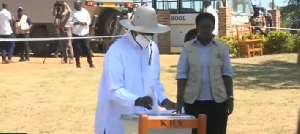LET’S DEVELOP, SUPPORT AND MAKE BETTER USE OF GHANAIAN TALENTS BOTH AT HOME AND ABROAD
A reader of my April 19/09 article on “S. African farmers coming to Ghana” raised very pertinent issues that need to be addressed. The reader quoted the statement below from my article.
“Already, successive Ghana governments have given arable lands to mining companies who have destroyed farms to make way for mining, and paid farmers a pittance, thereby impoverishing them. Farmlands are also being used up for building houses, while our population keeps growing." And argued in the nutshell, “ … It is only with Commercial Farming and its associated adoption of modern Agricultural Techniques that could save us from eventual famine.”
My response is that commercial farming isn’t a panacea to the pressures on the land. We could end up having mega-commercial farms taking up larger chunks of land to mass -produce for exports. Some people would argue that that would be good for the economy. I’d disagree, simply because, the foreign exchange from the exports won’t be retained in the country. This is evident in the mining sector. Just last week the Minister of Finance Dr. Duffour is reported to have “Appealed to the mining companies in Ghana to …increase the percentage of foreign exchange earnings retained in the country.”
There has been (foreign) commercial farming in Central American and Caribbean countries for years. However, their reliance on commercial farming hasn’t helped them develop; they’re still poor. Some of them, especially Haiti, have experienced land degradation caused by commercial farming. They’ve also suffered from foreign military interventions.
Foreign military interventions and political interference in those countries have mainly emanated from the need to protect foreign Big Business interests. Interventions have come under the guise of anti-communism/pro-democracy doctrines. As one retired General Smedley Butler of the US Marines Corp confessed, “…that he spent most of his 33 yrs in the Marines being a high class muscle man for Big Business… I helped in raping half a dozen Central American republics for the benefits of Wall Street. … And helped make Honduras ‘right for American Fruit companies.” said the General. Washington’s War on Nicaragua by Holly Sklar. You can find excerpts from www.amazon.com/washingtons-war-holly-sklar. A most recent foreign interference is happening in Bolivia. http://www.sourcewatch.org/index.php?title=Bolivia http://www.foreignpolicy.com/resources/forum/viewtopic.php? T=4883&view=previous;
Entrepreneurship Even if one subscribes to the commercial farming idea, we don’t need foreign entrepreneurs to come and run commercial farms. Our universities and colleges are churning out hundreds of graduates from agric programs each year. Other Ghanaians study agric abroad and return. Why can’t the gov’t encourage and support these graduates to form joint ventures among themselves to use their knowledge to create jobs for themselves and employ others to feed the nation? By the way, Ghana is the world’s second largest cocoa producer. Ghanaian farmers made that possible. The gov’t at least provides a market for the cocoa farmers plus subsidized inputs and technical support. Similar incentives could be used to support Ghanaians cultivating other crops to feed the nation.
Land Acquisition Some of the readers of my article suggest that land could be leased to the foreign farmers. The problem is that even if the lands are leased on short term basis, as some readers suggest, it wouldn’t be easy for a future gov’t to tell the farmers that the lease is up so they should vacate the lands. Where would they go? They would marshal outside support to keep the lands the gov’t would give to them and what they’d buy from chiefs and poor farmers. That’s where the trouble lies. We shouldn’t think that because the lands in Ghana wouldn’t be acquired by force or edict, what’s happening elsewhere couldn’t happen here. Our land tenure system is weak, so we have to be very careful.
Conclusion Foreign Commercial farming isn’t a cure-all for the pressure on the land, or our economic woes. We rather need to modernize technology in the agric sector, to improve post harvest techniques, improve our road, storage, processing infrastructures, and secure markets for our farmers. We need to empower, develop and support the country’s human capital, both at home and abroad to feed, and build the country. Besides, we require effective resource management, and population control mechanisms to forestall overcrowding and food insecurity.
It’s prudent to learn from other nation’s experiences. We have to anticipate what could happen in the future, and understand that what has happened and still happening to others can happen to next generations of Ghanaians, if we’re not careful.
We need an effective industrialization policy to move the country from the commodities -based economy. We have to develop and support industrial entrepreneurs to add value to what we produce, and also manufacture some of what we need. Ghana cannot develop based on agric, and buying and selling what others produce. “The East Asian countries: ‘four tigers” (Hong Kong, S. Korea, Singapore, and Taiwan, China) and others, developed their economies by supporting agriculture, expanding labour-intensive industries, and investing heavily in basic social services.” Adjustment in Africa: Reforms, Results and the Road Ahead, 1994.
It’s Ghanaians who would develop Ghana. We can do with some help from well- meaning individuals and entities, especially in industrialization- non-agric sectors. However, the help should come to supplement but not to substitute our efforts, and control our destiny and that of future generations of Ghanaians. Long Live Ghana!
By Kofi Asamoah.
Opinions of Tuesday, 5 May 2009
Columnist: Asamoah, Kofi














